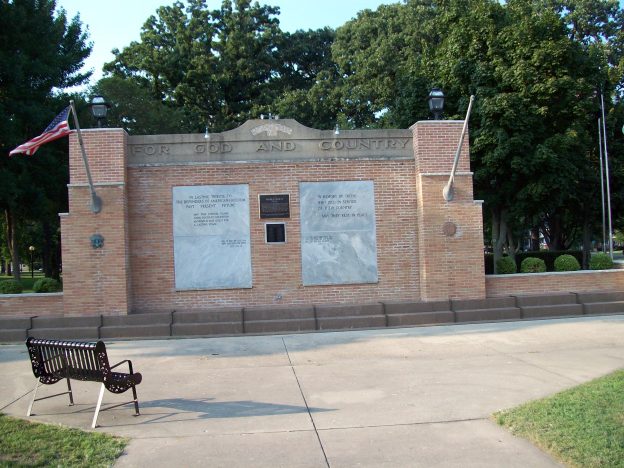1969 was the next-to-last time Memorial Day would be observed on May 30th. It was also the first time I participated in a small-town parade. This was before a day dedicated to the people who gave their lives in war became a three-day federal holiday and an excuse to sell mattresses and cars. (I must admit, however, that I got a great deal on a new laptop on Monday.)
I’d enrolled in band my freshman year at Streator High School and took up the flute, largely out of guilt. My sister had started flute lessons two years before but I complained about listening to her practice so much that she quit. This was one of many attempts to atone for my transgressions that I’d make in the coming decades. It turned out not to be a bad decision; hey, it worked for Herbie Mann and Ian Anderson. But don’t ask me to play for you.
I wouldn’t play with the band until the following school year but our director thought everyone in band should participate in the Memorial Day parade and assigned me to the color guard. We would hoist heavy hardwood flagpoles into sturdy leather carriers that draped around our shoulders and ended in a pouch that looked like a codpiece (prompting the inevitable dick jokes) and lead the band in the annual remembrance.
The parade route from the War Memorial at the City Park to Riverview Cemetery was about a mile, so we made a practice run a few days ahead to make sure we could march in formation and not embarrass ourselves. Four of us lined up in the middle of Morrill Street on a warm, overcast afternoon, with our flags and poles, and marched towards the football field a few blocks away. Gary, one of the two trumpet players who would do “Taps” at the cemetery, told me to count as we marched.
“One, two, three, four. One, two…”
“No, that’s not it. Count like your marching in the Army!”
“I never been in the Army. Whaddya mean?”
Gary took over.
“Left, right, left, right…no, your other right foot! C’mon, pay attention.”
We got in sync and then Gary switched to an old Army cadence:
Sergeant Brown is turning green
Hut, two, three, four
Someone pissed in his canteen
Hut, two, three, four
I snorted but that flagpole was a lot heavier than I anticipated, so I kept marching. We made it to the football field and back without incident and figured we were ready.
Our band uniforms were at least twenty or thirty years old. They were a muted navy blue, god-awful heavy, and smelled like musty basements and sweat. We also wore spats – those white shoe covers worn by gangsters in the 1920s. We dressed in the band room and then walked the five blocks to the park, gathering around the memorial before lining up in the street.
I don’t remember what music we played as we made our way down Main Street; it’s not that important. But the music stopped when we got to the bridge over the Vermilion River, a block away from the American Legion. The drummers continued to tap out a rhythm on the edges of their drums as we walked silently, past Westgate Plaza, past the public swimming pool, and into the cemetery.
Gary and I walked to the far end of the cemetery and stopped behind a cluster of evergreens. We waited as the rest of the procession assembled inside the gates. Someone may have said a prayer or given a small speech, but we were too far away to hear.
Then Fred, the first chair trumpet player, started “Taps,” pausing after each phrase. Gary, from our position in the trees, responded with the same phrase, as a distant echo. Back and forth they played, reverently. It was more poignant because everyone knew someone who had died in Vietnam and dreaded the deaths still to come.
A quarter of a century later I tried relating this ritual to my kids but had to stop as the tears rolled down my face. Our country was at peace then, but it was only temporary. Another conflict would follow, then another, and another. The Gulf War. Somalia. Bosnia. Kosovo. Afghanistan. Iraq. ISIL. We became numb and didn’t want to think about the devastation, the broken bodies and broken lives. Maybe we just got tired.
So, on this May 31st, the day after what we recalled as Memorial Day, ponder this passage from the Gettysburg Address:
“…It is for us the living, rather, to be dedicated here to the unfinished work which they who fought here have thus far so nobly advanced. It is rather for us to be here dedicated to the great task remaining before us — that from these honored dead we take increased devotion to that cause for which they gave the last full measure of devotion — that we here highly resolve that these dead shall not have died in vain…”
Peace be with you.
